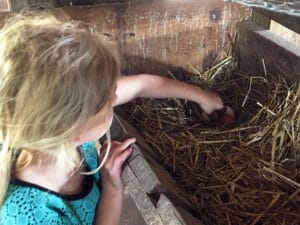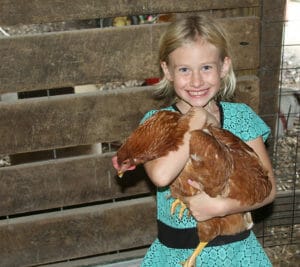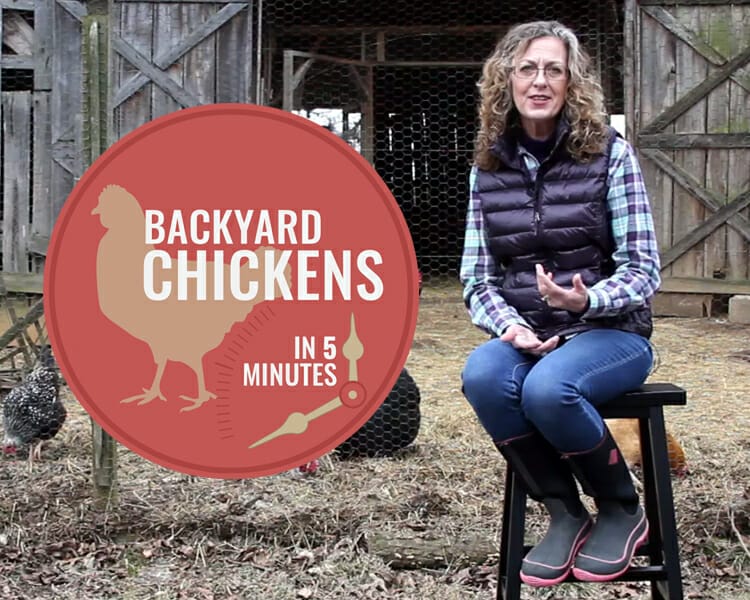As parents, we want our children to feel safe and loved. We also want them to have opportunities to learn and grow, to become successful and well-rounded.
One of the best places we can provide those opportunities is in our own home. We can help our kids discover their passions, develop important life skills and build a healthy self-confidence.
Even better is that because our kids are learning right where they live, we get to participate and have the joy of witnessing their development.
So, how can we create a home where the mind grows, becomes curious, is engaged and explores? What activities can promote this but also teach our kids important principles like responsibility, commitment and investment?
More and more families are finding the answer in — are you ready for this? — backyard chickens!
Here are 7 ways keeping a backyard flock can be both educational and fun for your entire family:
 1. Learning Responsibility
1. Learning Responsibility
First, it is important for children to have a job in the family. Having a job creates confidence, independence and a sense of responsibility.
Baby chicks are super-cute and your kids will fall in love with them immediately. (So will you!) But, as with any pet, raising chickens takes commitment; not every part of it is fun.
Caring for animals is an important job. Just like we need food, water and a clean and safe home, so do your birds.
And, it’s not always convenient: if you keep your chickens locked in the coop at night (for security reasons, for instance), someone has to let them out first thing in the morning. Not a fun job when it’s freezing cold outside!
A great way for your kids to learn the “responsibility” that comes along with the “fun” is to have them:
- Let the chickens out in the morning (at least 1-2 days of the week)
- Provide daily food and water
- Collect eggs (this will be the fun part!)
- Clean the coop
- Inspect the coop and run for signs of predators
You or another adult should always supervise children when they are doing these tasks to ensure sure they are providing the right amount of food and water (and treats!), keeping the coop adequately clean and that no predators are lurking in the area.
(Be sure to read up on proper safety measures to keep your kids, yourself and your chickens healthy.)
TIP: Always have your children do their “chicken chores” before their free time. Teach them that Work comes before Play.
 2. Earning Income
2. Earning Income
Backyard chickens can be a great way for your kids to earn money, get a taste of entrepreneurship and learn the rewards of earnest work.
By encouraging your kids to sell eggs to friends, family and neighbors you give them the opportunity to learn things like salesmanship, customer relations, changing money, managing supplies and keeping an inventory. All of these are valuable skills that will serve them well as adults.
You can also take them to your local farmers markets so they can experience other “homestead enterprises” such as the selling of produce and crafts. This is also a great opportunity for them to meet other backyard chicken families and share tips and stories.
TIP: Consider having your children use part of their earnings to pay for chicken feed or other care. This will teach them the value of money, as well as exposing them to the expense side of business.
 3. Learning Stewardship
3. Learning Stewardship
Keeping chickens provides a great lesson about being a good steward of the earth. Your kids will learn how we can produce significantly less waste with just a little intentional effort.
For instance, chickens are omnivores; they eat both plants and meat. They love to eat food that your family might otherwise throw out, such as fruit and vegetable scraps and produce that has lost its freshness.
Giving your children the job of feeding the chickens from your unwanted food will drive home the importance of not letting anything go to waste.
You can also have your kids save the poop when they clean out the coop and run. Chicken droppings provide great nutrients, such as nitrogen, phosphorus and potassium, for your soil and compost.
Chickens love to eat bugs and if you let them free-range, they will provide a natural method of curbing the insect population in your yard.
Finally, if your kids get into the egg-selling business, have them ask their customers to return empty egg cartons. This will further reinforce the practice of recycling.
TIP: When you use chicken droppings to fertilize your plants, take the opportunity to explain to your kids how nature provides food for the chickens and then the chickens provide food for plants!
Been Thinking About Getting Chickens?
Get our FREE 3-part training, Backyard Chickens In 5 Minutes, a series of short videos that help you avoid some of the most common mistakes when raising chickens.
Been Thinking About Getting Chickens?
Get our FREE 3-part training, Backyard Chickens In 5 Minutes, a series of short videos that help you avoid some of the most common mistakes when raising chickens.
 4. Learning Where Food Comes From
4. Learning Where Food Comes From
In today’s society, people are largely indifferent to what they put in their bodies; most of us lack any relationship whatsoever with the food we are eating.
Owning chickens gives children an understanding of the source of their food. For most kids, their knowledge of where food comes from stops at the grocery store.
Caring for an animal that directly produces a food they then consume gives your children a connection and grounding that most of their peers will not have.
You can teach your children, from an early age, to appreciate how food is truly produced. By keeping backyard chickens, you are also teaching them that they have alternatives to commercially-produced food.
TIP: Crack open one of your eggs and a store-bought egg and compare them. In addition to the visual differences (your yolks will likely be richer in color), explain to your kids why your eggs are healthier.
 5. The Principle of Investment
5. The Principle of Investment
Keeping backyard chickens can teach your children patience and the concept of investment. A whole lot of work goes into a chicken’s care well before the first egg is laid.
Your kids will need to check on the chicks several times a day for a several-week period. They will need to transition them from brooder to coop and continue to feed and water them. They will need to be diligent about keeping their living quarters clean.
For most breeds, hens begin to lay eggs at 25-30 weeks of age. That’s a long time for a child to wait for that first egg!
Our children are growing up in a world of instant gratification and hyper-consumerism the likes of which the world has never seen. This is a good opportunity for you to have discussions about how “the best things in life take time.”
During this time you will also want to remind your kids that keeping chickens isn’t just about the goal of getting eggs. It’s also about being a good provider for a living thing that has been entrusted to their care.
TIP: When one of your hens lays the first egg, ask your kids what they are feeling at that moment. What do they think about what they have just experienced? What did they learn about putting in work before receiving the”reward” of fresh eggs?
 6. The Beauty and Mystery of Life
6. The Beauty and Mystery of Life
Raising chickens will provide your children many lessons in zoology, as well. They will learn the physiology and anatomy of chickens, for instance, why they need grit in their diet and how (unlike humans and many other mammals), they have only one waste orifice.
They will experience your chicks starting out as downy “fuzz butts” but within days sprouting feathers.
They will learn how those feathers keep an adult chicken warm while combs and wattles help keep them cool, with combs also serving to attract a mate. They will experience how chickens instinctively seek the highest point available for nightly roosting.
Additionally, your children will learn how eggs are both a food source for humans and the method of reproduction for chickens.
TIP: Get a diagram of a chicken’s anatomy and discuss with your children the purpose of each part. Have them identify various anatomical parts of your birds that correspond to the diagram.
 7. The Joy of Animals
7. The Joy of Animals
Perhaps the most important reason to own backyard chickens is the social development benefits for your kids. Though the years, studies have confirmed that pets have a measurable and positive impact on the development of a child’s social skills and self-esteem.
Your chickens won’t judge your kids, make fun of them or call them names. Their bond with your children will be unconditional.
They will also be quite entertaining.
Like people, chickens are social, inquisitive, have unique personalities and have some oddly funny behaviors. You will never be short of stories to tell. (Go to YouTube and see what we mean!)
Finally, it is known that kids who have pets spend more time outdoors, which is good news in today’s cyber-dependent age. Every child should experience grass-stained knees. Spending time outdoors, caring for and playing with your backyard chickens is not only good for your child’s social development, it will keep them “well grounded” as they grow up.


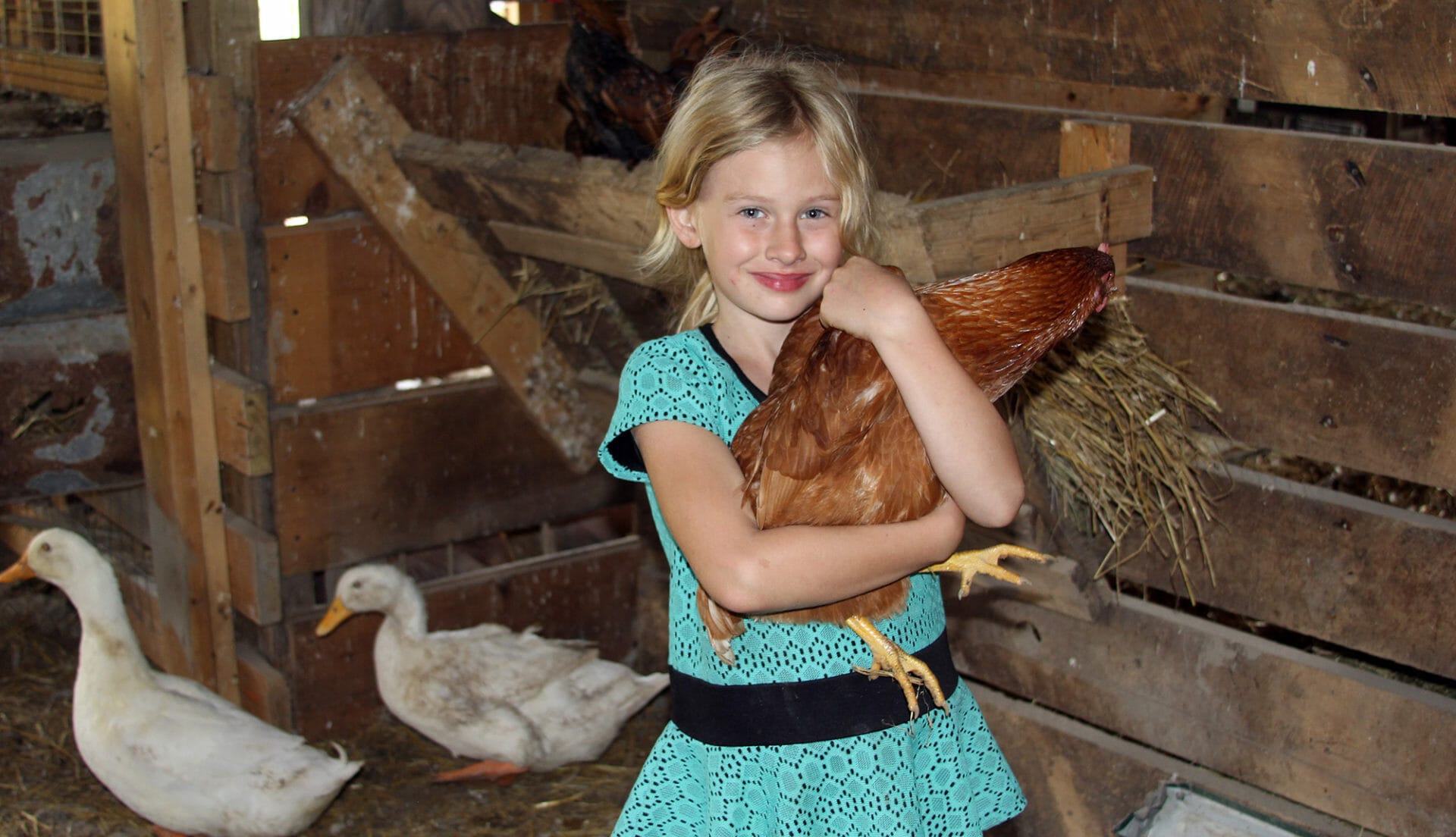
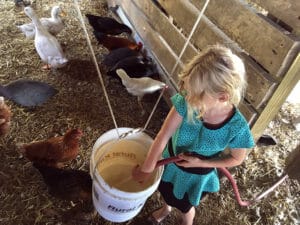 1. Learning Responsibility
1. Learning Responsibility 2. Earning Income
2. Earning Income 3. Learning Stewardship
3. Learning Stewardship
